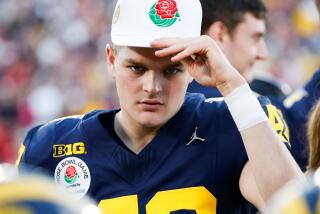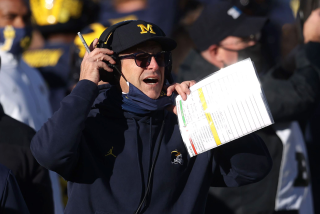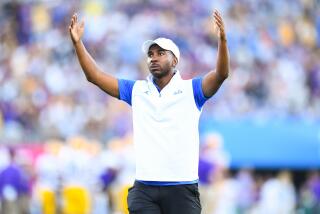State Enduring Hard Times Rallies Around Football Team
CLARKSBURG, W.Va. — Some say it’s the biggest thing to hit these parts since mountains.
One native, the best football player ever at the school, calls it the most historic event since they separated the Virginias.
For those all too familiar with West Virginia’s depressing economic conditions, the idea of a $3 million payday for a football game boggles the mind.
If Monday’s Fiesta Bowl, pitting West Virginia against Notre Dame in Tempe, Ariz., has stirred the imagination of football fans all over the country, imagine how it has stirred the pride of a state that has been on the down side far too long.
In small, diverse towns like Romney, Welch, Berkeley Springs and Kenova, the game will not obliterate reality, but it will serve as a reminder that it’s possible to overcome obstacles that often seem insurmountable.
The larger cities (none with a population over 65,000) of Charleston, Huntington and Parkersburg feed off the attention, and smaller places like Clarksburg and Fairmont derive some residual financial gain.
But, perhaps it is in the smaller principalities, many with a population count below 300, where the game will have its greatest impact.
From the great stars in West Virginia University’s athletic history to the people trapped in the state’s long unemployment lines, it is easy to sense a feeling that says “our time has come.” And that feeling is not necessarily confined within the state borders.
With all due respect to Notre Dame’s widespread alumni, real and imagined, West Virginia might be the most popular underdog in history when the two schools meet for the national championship on Monday.
“I think that is probably true,” Fred Schaus, WVU’s first great basketball player, later its coach and now the athletic director, said. “They (Notre Dame) have the great tradition, and we’re the new guy on the block and there’s a natural tendency to root for the underdog.”
There is not universal optimism that the Mountaineers can beat the Irish. Perhaps the caution stems from other disappointments, not necessarily limited to sports.
“I don’t know if they can do it,” said a hotel desk clerk in Clarksburg, “but at least they have a chance.
“Whatever, New Year’s Eve will run second to the Fiesta Bowl this week. Nothing comes before WVU football.”
It wasn’t always that way. West Virginia’s tradition flowed more easily to basketball. In a state with fewer than 2 million people, there were plenty of home-grown basketball heroes, like Hot Rod Hundley, Jerry West, Rod Thorn and current Mountaineers coach Gale Catlett.
“It’s unbelievable to me that they could accomplish what they have in football,” said Thorn, whose hometown, Princeton, is in the southeastern part of the state. “What a lot of people don’t realize is that the facilities at the school rate with any in the country, but the tradition there has always been in basketball. But that’s a good team, better than people might suspect, and I’m convinced they’re going to win it.”
Hundley, from Charleston, began the Mountaineers’ golden era in basketball, preceding West and Thorn. He looks at the Fiesta Bowl game as if it were a Hollywood script.
“If they can win this game, it will be the biggest thing ever, especially going against Notre Dame,” Hundley said. “It’s like beating the Yankees in baseball or the Celtics and Lakers in basketball.”
In 1959, West led the Mountaineers to the National Collegiate Athletic Association championship game, where they lost a heartbreaker to California, 71-70.
West, a junior, was named the tournament’s outstanding player. That’s as close to the current frenzy as West Virginia has ever come, although the media glare then was little more than a flashlight in the woods compared with the attention focused on this game, which will attract 1,000 journalists.
“This is easily the biggest sports event since West was playing,” Dave Hardin, a 1968 WVU graduate who grew up in Huntington on the Ohio-Kentucky border, said. “Then the whole state was tuned into the radio, but you can’t compare it to this--the whole country will be watching.”
Sam Huff came out of West Virginia University in 1956 and played 13 years with the New York Giants and Washington Redskins of the NFL, landing in the college and professional halls of fame. He will serve as a commentator on the radio broadcast of the Fiesta Bowl.
“This is the biggest thing to happen in the state in history, since Virginia decided it didn’t want us anymore,” Huff said. “God bless (head coach) Don Nehlen for what he’s done for the school.”
More to Read
Go beyond the scoreboard
Get the latest on L.A.'s teams in the daily Sports Report newsletter.
You may occasionally receive promotional content from the Los Angeles Times.










